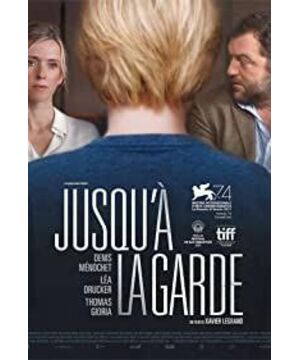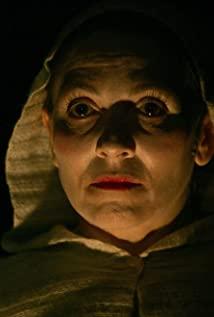The trailer of the film "Guardianship", "Map of Domestic Violence", revealed a set of data: In the United States, an average of 5 million women experience domestic violence every year; in India, more than 30% of women have been beaten by their husbands; in China , On average, a woman is raped every 7 seconds, and the victim chooses to report to the police after suffering an average of 35 domestic violence...
And in France, famous for its romance, things weren't much better. About 500,000 women experience domestic violence every year, and an average of one death due to domestic violence occurs every three days.
French director Xavier Legrand was stunned when he learned of this statistic. So he filmed the domestic violence film "Guardian", which won the Best Debut Award and Best Director Award at the 74th Venice Film Festival.
It is no easy task to win the director award for his debut, which shows that this newcomer is quite mature in directing skills.
With a trace of curiosity and suspicion, I watched "Guardianship" and found that it really deserved its name.
Although dealing with realistic themes such as "domestic violence", the director did not take the speculative line of an ethical film, but turned it into a psychological thriller about how domestic violence destroys a family.
In terms of creating a sense of horror, the director is also very thoughtful, always taking "voice" as the first protagonist. This idea has been implemented even from the first second of the film.
While we see the subtitles displayed on the black screen, the screen is continuously lit, showing the scene of the office. And every lighting is not for no reason, but awakened by a sound. The first time is the sound of the door opening, the second time is the sound of turning on the lights, and the third time is the sound of knocking on the door. In this way, the director reminds the audience that the "voice" is the most dominant element in this film and can guide the narrative.
Moreover, unlike the usual thrillers, the sound used in "Guardian" is not a special sound effect, nor a soundtrack, but a real ambient sound, thus creating a very everyday sense of horror.
The most typical example in the film is the siren of the seat belt in the car. Short, harsh, one after another, it reflects the tension between the father and son in the car, and also gives the audience off-screen a great sense of psychological pressure.
Another example is the last paragraph of the film, where the domestic abuser tries to break into his wife's home. The director hardly used the picture, but used the distance and strength of the sound throughout the whole process to present the every move of the intruder.
From the doorbell ringing at the very beginning, to the approaching footsteps, to the door smashing, roaring, gunshots, and the sound of breaking in... This series of sounds fills the gaps in the picture and amplifies the horror effect at the same time. At the same time, the wife and son in the house lost their living space step by step as the sound approached. They hid from the living room to the bathroom, and finally curled up into the bathtub.
It should be said that this series of scheduling from sound to space is excellent.
In addition to the sound design, the director is also unique in presenting "violence".
He does not directly portray violence, but focuses on the shadows left by violence to reflect the depth of the wounds. It is embodied in the three direct victims "wife Miriam, daughter Josephine and son Julian".
At the beginning of the film, the couple have been separated for more than a year, but the shadows left by the husband are everywhere.
My wife, Miriam, lived in fear every day. To avoid her husband, she took her children to live in another city. On her face, you can hardly see a smile, but you can see a trace of perseverance in the faint suffering. This perseverance is not innate, but forced out by her husband's violence.
Although the film did not mention it, we can guess that she must have been soft-hearted in the past, but after the violence came back again and again, she finally calmed down. When her husband cried to her again, she was indifferent and said to her son coldly, "Don't tell anyone he's been here."
Seeing this, you won't feel relieved, on the contrary, you will feel sorry for this woman. Because she put on herself a coldness that should not have been there.
This coldness made Miriam look a little arrogant.
Some people even accused her of being a control freak in the film review. The specific performance was that in the scene at the station, when her daughter skipped class to see her boyfriend off, Miriam called and reprimanded her, when her daughter said, "I really can't stand it. already."
On the surface, the mother does put a lot of pressure on her daughter. But I don't think this scene is about accusing the mother, rather, it's still an accusation of violence. It's just that the shadow of violence this time is reflected in her daughter's overreaction.
Think about it, my daughter is absent from school, and my mother calls to ask, is this too much? Not at all.
Why is the daughter so emotional?
It was precisely because her father once restricted her from finding a boyfriend and fought her that he completely inspired her rebelliousness, so much so that she could not even accept a basic inquiry now.
This kind of overreaction is the most terrifying part of violence. It makes people feel extremely sensitive to negative emotions, so that "caring" is mistaken for "control".
Not only this, the family behind moved into the new house, the younger brother seized the big house, and Josephine scolded him fiercely, "How can you be the same as that person (referring to the father of domestic violence)!"
This sentence is also shocking. It is not saying that the younger brother has really become a father, but that although the family has gotten rid of the father on the surface, the internalized violence factor still exists in the family's discourse and daily interactions.
In fact, in the whole film, the daughter Josephine is the only person who has not confronted her father directly, but the scars on her body are the most exposed.
The most typical scene is a birthday party, she stood on the stage and sang "Proud Mary", the lyrics sang: "We are drifting, we are not drifting in the water..." At that moment, my father was wandering outside, and the date on the stage Sephine was uneasy, unable to fully devote herself to it. It was her 18th birthday, a coming-of-age ceremony, but she could not spend it peacefully because of the shadow of domestic violence.
After the party, she and her boyfriend quietly cleaned up the mess, then turned off all the lights and left silently, which became the most tragic scene in the whole film. How sad that a girl's 18th birthday party ended in complete darkness.
In the film, the son Julian is the one who has the most contact with his father. After losing his family, his wife, and his daughter, the only thing his father had was custody of Julian.
Facing this violent father, Julian learned to lie.
We even begin to wonder if the father's violence will be passed on to the child. There is a scene, the director's design is very clear, it is the only scene in the film where three generations of grandchildren are in the same scene. We found that Julian's grandfather was also a violent person. At the dinner table, he and his father were together. The words disagreed, and they fought fiercely, and Julian, who was on the side, watched.
This kind of violence comes not only from genes, but also from the shaping of people by families. The film uses this scene to bury the possibility of this tragedy for us.
So far, we have seen the scars left by domestic violence on everyone.
It's not over yet.
The most interesting design of the film is the first two scenes.
It might even be a little weird to watch this movie at first. Because as soon as the film came up, it was a full 15-minute hearing. It was at this hearing that father Antoine moved the judge with sincerity and won back the custody of his son.
In the next 70 minutes, we saw that Antoine showed the true face of the devil little by little.
While watching it, I was thinking, why did the director arrange this? Was that 15-minute hearing necessary?
Until the end of the film, Antoine broke into his wife's home with a shotgun and was overpowered by the police who came. At this time, the view turned to the old lady of the neighbor, and she looked out the door in horror, and finally closed the door quietly and connected three locks.
That's when I realized how important these outside perspectives are, whether judges or neighbors.
In fact, they all express: a kind of closedness of the family.
This closedness makes it difficult for outsiders to see through, so a family's suffering can often only be digested internally, and it is difficult for others or the law to intervene.
It sounds hopeless, but it's the truth.
Don't believe the so-called "outsiders" you watch in the film, including the parents, sister, lover of wife Miriam, boyfriend of daughter Josephine... These people are on the verge of domestic violence.
But the edge is the edge after all, and they are powerless to those who are in the vortex.
The only thing a parent can do is to temporarily take in their daughter; what a sister can do is to stay by her side as much as possible; a lover can do even less, and even when confronted with his girlfriend's husband, he himself lacks legitimacy...
Therefore, in the time that these outsiders cannot cover, there is still a long darkness waiting for the protagonists.
They can only face it by themselves, there is no other way.
This is perhaps the saddest part of the domestic violence problem.
"Guardianship" is an emotional film. It does not rely on reasoning or stories. Instead, it conveys the harm caused by "domestic violence" to every viewer through an intuitive experience formed by audio-visual language.
Its persuasion is strong enough.
I believe that everyone who walks out of the theater will have a thought while having lingering fears: each of us should have a zero-tolerance attitude towards domestic violence.
View more about Custody reviews










